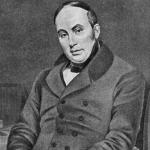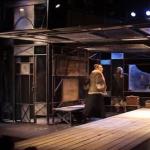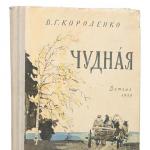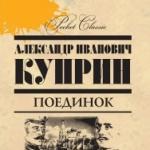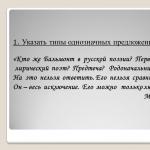Vladimir korolenko is wonderful. Vladimir korolenko - wonderful Other retellings and reviews for the reader's diary
Vladimir Galaktionovich Korolenko (1853-1921)
“Wonderful” ... Why is the first story and the entire collection called so strange?
Gendarme Gavrilov, accompanying the exiles to the settlement, talks about a girl whom he cannot forget. This girl seems to him unlike other people, strange. After meeting her, Gavrilov even decided to leave his service as a gendarme. What impressed him so much with the revolutionary girl, what is so remarkable about her?
“As we drove - the wind was siver, - I was chilled too. She coughed hard and lifted the handkerchief to her lips, and on the handkerchief, I see, there was blood. It was as if someone had stabbed me in the heart with a pin; “Eh, I say, young lady, how can you! You are sick, but on such a road you have gone - autumn, cold! .. No thing, I say, you can do that! "
She threw her eyes at me, looked, and only again began to boil inside her; “What are you, he says, stupid, or what? You don’t understand that I am not going on my own. Good, he says; he's lucky himself, but he pokes pityingly there too! "
The strength of this sick girl, her conviction, faith in the revolution, contempt for the enemies amazed Gavrilov, aroused in him a feeling of respect for her.
The main characters are the gendarme Gavrilov and the exiled girl.
Korolenko wrote this story in a tsarist prison, he himself lived for many years in exile and met many revolutionaries. You will read about the life of a writer in the introductory article.

The collection also contains other stories by Korolenko: "Dream of Makar", "Sokolinets", "At-Davan". They are very different, the most difficult story is "Dream Makar". It is, perhaps, more interesting for sixth graders.
Is the station coming soon, coachman?
It’s not yet soon, - it’s unlikely to get to the snowstorm, - you see, it’s rusty, the siver is coming.
Yes, it’s clear that we’re not going to get to the blizzard. It gets colder by evening. You can hear the creaking of the snow under the runners, the winter wind - the sivera - hums in the dark forest, the branches of fir trees stretch out to the narrow forest road and sway gloomily in the descending dusk of the early evening.
Cold and uncomfortable. The wagon is narrow, crushes under the sides, and even inappropriately the checkers and revolvers of the escorts dangle. The bell plays some kind of long, monotonous song, in tune with the singing blizzard.
Fortunately - here is the lonely light of the station at the edge of the humming forest.
My escorts, two gendarmes, clattering a whole arsenal of weapons, shake off the snow in a hot, heated, dark, sooty hut. Poor and unfriendly. The hostess reinforces a smoky torch in the lamp.
Do you have something to eat, hostess?
We have nothing ...
And the fish? The river is not far off here.
There was a fish, but the otter was happy.
Well, potatoes ...
And-and, priests! Our potatoes are frozen, but they are all frozen.
Nothing to do; samovar, surprisingly, was found. Warmed up with tea, bread and onions were brought by the hostess in a basket. And the blizzard was playing out in the yard, fine snow fell into the windows, and at times even the light of the torch shuddered and hesitated.
You will not be allowed to go - spend the night! - says the old woman.
Well, let's spend the night. After all, sir, you have nowhere to hurry either. You see - what a side here! .. Well, and there it is even worse - believe the word, - says one of the escorts.
Everything was silent in the hut. Even the hostess folded up her box of yarn and lay down, ceasing to shine on the torch. Darkness and silence reigned, broken only by the gusty blows of the blowing wind.
I did not sleep. In my head, under the sound of the storm, heavy thoughts rose and flew one after another.
Can't sleep, you see, sir? - says the same guide - "senior", a rather handsome man, with a pleasant, even seemingly intelligent face, quick, knowing his job and therefore not a pedant. On the way, he does not resort to unnecessary constraints and formalities.
Yes, I can't sleep.
Some time passes in silence, but I hear that my neighbor is not asleep either - it feels like he has no time for sleep, that some thoughts are wandering in his head. Another guide, a young "henchman", sleeps in the sleep of a healthy, but very tired person. At times he mumbles something indistinctly.
I am surprised at you, - the even chest voice of the sergeant is heard again, - the people are young, noble people, educated, one might say - but how you spend your life ...
Eh, sir! Surely we can’t wither! .. We understand quite enough, maybe life was not in such a way and we’re accustomed to this from childhood ...
Well, you are empty talking ... There was a time and weaned ...
Are you really having fun? he says in a tone of doubt.
Are you having fun? ..
Silence. Gavrilov (let's call my interlocutor) is apparently thinking about something.
No, sir, we are not happy. Believe the word: sometimes it happens - just, it seems, I would not be looking at the light ... Why is it, I don't know, - only sometimes it will come up like that - a sharp knife, and that's all.
Was the service difficult?
Service by service ... Of course, not festivities, and the bosses, I must say, are strict, but just not from this ...
So why?
Who knows?..
Silence again.
Service what. Behave yourself, that's all. I, all the more, home soon. From the delivery I, so the deadline comes out. The chief even says: "Stay, Gavrilov, what are you going to do in the village? You are good on your account ..."
Will you stay?
No. True, it is at home too… I’ve lost the habit of peasant work… Food too. Well, and, of course, getting around ... This rudeness ...
So what's the deal?
He thought about it and then said:
Here I am, sir, if you don’t get bored, I’ll tell you one case ... With me was ...
Tell ...
I entered the service in 1874, in the squadron, straight from the acceptance test. He served well, one might say, with full zeal, more and more in dress: where to parade, to the theater - you know yourself. He was well trained in literacy, well, and the authorities did not leave. Our major was a fellow countryman and, seeing my diligence, he once called me to him and said: "I will introduce you, Gavrilov, as a non-commissioned officer ... Have you ever been on business trips?" - No, I say, your honor. - "Well, he says, next time I will appoint you as an assistant, take a closer look - it's a simple matter." - I listen, I say, Your Excellency, I am glad to try.
And on business trips, I certainly have never been - that's with your brother, then. It’s even, say, a simple matter, but still, you know, the instructions must be learned, and quickness is needed. OK then…
A week later, the post calls me to the chief and one non-commissioned officer. Have come. "You, he says, go on a business trip. Here's a helper for you," says the non-commissioned officer. instructions for you, tomorrow you will receive money and with God! .. "
Ivanov, a non-commissioned officer, rode with me in the senior, and I in the assistants - that's how I now have a different gendarme. The elder is given a treasury bag, he receives money in his hands, papers; he signs, keeps these scores, well, and a private to help him: send where, to look after things, then something else.
OK then. In the morning, a little light still, - they left the chief, - I look: my Ivanov has already managed to drink somewhere. And the man was, I must say frankly, not suitable - he was now demoted ... In front of his superiors - how a non-commissioned officer should be, and even so that he made slander on others, curry favor. And a little out of sight, now he will wrap himself up, and first of all - have a drink!
We arrived at the castle, as it should, the paper was submitted - we are waiting, we are standing. I am curious - what kind of young lady will have to be carried, but we will have to carry it along the route far away. We drove along this very road, but it was assigned to the county town, not to the parish. So I’m curious for the first time: what, they say, is this politician?
We just waited about an hour or so, while her things were collected - and there was a small bundle of things with her - a little skirt there, well, something else - you know yourself. There were also books, but there was nothing else with her; poor, apparently, parents, I think. As soon as they take her out, I see: still young, as a child seemed to me. Brown hair, gathered in one braid, blush on the cheeks. Well, then, I saw - completely pale, white all the way. And right away I felt sorry for her ... Of course, I think ... The bosses, I'm sorry ... they won't punish in vain ... So, they made some quality in this, in the political part ... Well, but all the same ... sorry, so sorry - just, well !. ...
She began to dress: coat, galoshes ... Her things showed her to us - the rule means: according to the instructions, we are obliged to look at things. "We ask, what money will be with you?" It turned out to be a ruble twenty kopecks of money, and the elder took it. "You, young lady," she says, "I must search."
How it flares up here. The eyes lit up, the blush came out even deeper. Lips thin, angry ... As you looked at us - believe me: I am intimidated and dare not approach. Well, and the elder, you know, having drunk, climbs right up to her. "I, he says, must; I, he says, have instructions! .."
As soon as she shouts, - even Ivanov and he backed away from her. I look at her - her face turned pale, not bloodshot, and her eyes darkened, and angry, pretentious ... She stomps with her foot, says a lot, - only I, I must admit, did not listen well to what she was saying ... The caretaker was also frightened, brought her water in a glass ... "Calm down, - asks her, - please, he says, have pity on yourself!" Well, she didn't respect him either. "You barbarians, he says, are slaves!" And he expresses other similar daring words. Whatever you want: contrary to the authorities, this is not good. Look, I think, a snake ... A noble spawn!
Korolenko Vladimir Galaktionovich
Vladimir Galaktionovich Korolenko
(Essay from the 80s)
Is the station coming soon, coachman?
It’s not yet soon, - it’s unlikely to get to the snowstorm, - you see, it’s rusty, the siver is coming.
Yes, it’s clear that we’re not going to get to the blizzard. It gets colder by evening. You can hear the creaking of the snow under the runners, the winter wind - the sivera - hums in the dark forest, the branches of fir trees stretch out to the narrow forest road and sway gloomily in the descending dusk of the early evening.
Cold and uncomfortable. The wagon is narrow, crushes under the sides, and even inappropriately the checkers and revolvers of the escorts dangle. The bell plays some kind of long, monotonous song, in tune with the singing blizzard.
Fortunately - here is the lonely light of the station at the edge of the humming forest.
My escorts, two gendarmes, clattering a whole arsenal of weapons, shake off the snow in a hot, heated, dark, sooty hut. Poor and unfriendly. The hostess reinforces a smoky torch in the lamp.
Do you have something to eat, hostess?
We have nothing ...
And the fish? The river is not far off here.
There was a fish, but the otter was happy.
Well, potatoes ...
And-and, priests! Our potatoes are frozen, but they are all frozen.
Nothing to do; samovar, surprisingly, was found. Warmed up with tea, bread and onions were brought by the hostess in a basket. And the blizzard was playing out in the yard, fine snow fell into the windows, and at times even the light of the torch shuddered and hesitated.
You will not be allowed to go - spend the night! - says the old woman.
Well, let's spend the night. After all, sir, you have nowhere to hurry either. You see - what a side here! .. Well, and there it is even worse - believe the word, - says one of the escorts.
Everything was silent in the hut. Even the hostess folded up her box of yarn and lay down, ceasing to shine on the torch. Darkness and silence reigned, broken only by the gusty blows of the blowing wind.
I did not sleep. In my head, under the sound of the storm, heavy thoughts rose and flew one after another.
Can't sleep, you see, sir? - says the same guide "senior", a rather handsome man, with a pleasant, even seemingly intelligent face, quick, knowing his job and therefore not a pedant. On the way, he does not resort to unnecessary constraints and formalities.
Yes, I can't sleep.
Some time passes in silence, but I hear that my neighbor is not asleep either - it feels like he has no time for sleep, that some thoughts are wandering in his head. Another guide, a young "henchman", sleeps in the sleep of a healthy, but very tired person. At times he mumbles something indistinctly.
I am amazed at you, - the even chest voice of the non-commissioned officer is heard again, the people are young, noble people, educated, one might say - but how you spend your life ...
Eh, sir! Surely we can’t wither! .. We understand quite enough, maybe life was not like that, and we’re accustomed to this from childhood ...
Well, you are empty talking ... There was a time and weaned ...
Are you really having fun? he says in a tone of doubt.
Are you having fun? ..
Silence. Gavrilov (let's call my interlocutor) is apparently thinking about something.
No, sir, we are not happy. Believe the word: sometimes it happens - it just doesn't seem to be looking at the light ... Why, I don't know, only sometimes it will come up like that - a sharp knife, and that's all.
Was the service difficult?
Service ... Of course, not a festivities, and bosses, I must say, are strict, but just not from this ...
So why?
Who knows?..
Silence again.
Service what. Behave yourself, that's all. I, all the more, home soon. From the delivery I, so the deadline comes out. The boss even says: "Stay, Gavrilov, what are you going to do in the village? You are good on your account ..."
Will you stay?
No. True, it is at home too ... I have lost the habit of peasant work ... Food too. Well, and, of course, getting around ... This rudeness ...
So what's the deal?
He thought about it and then said:
Here I am, sir, if you don’t get bored, I’ll tell you one case ... I was with me ...
Tell me ...
I entered the service in 1874, in the squadron, straight from the acceptance test. He served well, one might say, with full zeal, more and more in dress: where to parade, to the theater - you know yourself. He was well trained in literacy, well, and the authorities did not leave. Our major was a fellow countryman and, seeing my diligence, he once called me to him and said: "I will introduce you, Gavrilov, as a non-commissioned officer ... Have you ever been on business trips?" - No, I say, your honor. - "Well, he says, next time I will appoint you as an assistant, take a closer look - it's a simple matter." - I listen, I say, Your Excellency, I am glad to try.
And on business trips, I certainly have never been - that's with your brother, then. It’s even, say, a simple matter, but still, you know, the instructions must be learned, and quickness is needed. OK then...
A week later, the post calls me to the chief and one non-commissioned officer. Have come. "You, he says, go on a business trip. Here's a helper for you," says the non-commissioned officer. instructions for you, tomorrow you will receive money and with God! .. "
Ivanov, a non-commissioned officer, rode with me in the senior, and I in the assistants - that's how I now have a different gendarme. The elder is given a treasury bag, he receives money in his hands, papers; he signs, keeps these scores, well, and a private to help him: send where, to look after things, then something else.
OK then. In the morning, a little light still, - they left the chief, - I look: my Ivanov has already managed to drink somewhere. And the man was, I must say frankly, not suitable - he was now demoted ... In front of the eyes of the superiors - how a non-commissioned officer should be, and even so that he made slander on others, curry favor. And a little out of sight, now he will wrap himself up, and first of all - have a drink!
We arrived at the castle, as it should, the paper was submitted - we are waiting, we are standing. I am curious - what kind of young lady will have to be carried, but we will have to carry it along the route far away. We drove along this very road, but it was assigned to the county town, not to the parish. So I’m curious for the first time: what, they say, is this politician?
We just waited about an hour or so, while her things were collected - and there was a small bundle of things with her - a little skirt there, well, something else - you know yourself. There were also books, but there was nothing else with her; poor, apparently, parents, I think. As soon as they take her out, I see: still young, as a child seemed to me. Brown hair, gathered in one braid, blush on the cheeks. Well, then, I saw - completely pale, white all the way. And immediately I felt sorry for her ... Of course, I think ... The bosses, excuse me ... in vain will not punish ... So, she made some quality in this, in the political part ... Well, all the same. .. sorry, so sorry - just, well! ..
Korolenko wrote the essay "Wonderful" in 1880 in a transit prison in Vyshny Volochyok. He passed it on through friends illegally. But the manuscript was not published. Neither the Slovo magazine nor Otechestvennye zapiski could do this for censorship reasons. In 1893, the essay was published in London by the Russian Free Press Foundation. It was published in Russia illegally, until in 1905 it was published in the journal "Russian wealth" in book 9 called "Business trip". Later, Korolenko returned the title to the essay, shifting the emphasis from Gavrilov to Morozova. He planned to dedicate it to Evelina Ulanovskaya, an exiled student from St. Petersburg, whom he met at Berezovskiye Pochinki, but this plan was not implemented.
Literary direction and genre
The work has the subtitle "An Essay from the 80s". Essay is an artistic and journalistic genre based on real events. In a short essay, Korolenko tells the story of not only an exiled revolutionary, but also a gendarme. The details of the life of the coachman, the hostess of the hut, at which the hero-storyteller is staying, give the narration a realistic and documentary character.
Topics and problems
The subject of the essay is the hard life of political exiles, whose punishment, from the point of view of Korolenko, is much more than a crime.
The problem of the essay is the impossibility of remaining human, and sometimes even living, in an inhuman society.
Plot and composition
The main plot of the essay has a compositional frame. The hero-storyteller, a political exile, is being transported by stage to Siberia. At the station, one of the gendarmes tells him about his first business trip - accompanied by a young revolutionary who did not live long in the settlement, dying of consumption.
Heroes
The narrator's image is autobiographical. Just like Korolenko, he was sent to Siberia for settlement. This is a person of a fine mental organization who takes the pain of other people to heart and suffers from the inability to help.
"Elder" Gavrilov - the escort of the exiled narrator: "A rather handsome man, with a straight, even seemingly intelligent face, quick, ... not a pedant." This is a gendarme who tends to reason.
Gavrilov is out of acceptance, his term of service is coming to an end, he is in good standing, and he is offered to stay. He has already lost the habit of peasant work, food, rough treatment, but still does not want to stay. He himself cannot explain why, but he was not happy: “Why, I don’t know, only sometimes it will come up like this — a sharp knife, and that’s all.”
Gavrilov serves with zeal, but he is not a formalist. He humanly pities the prisoners, not justifying them at all: "The authorities will not punish in vain." He tries to understand the motives of the actions of the prisoner. He begins to live with the needs of a completely stranger, so it even occurs to him to ask the authorities to take the prisoner as a wife. He "felt like a pin pricked his heart" when he saw that the girl was coughing up blood.
Gavrilov repeatedly violates the job description: he does not search the girl, does not close the window on the train, does not hide the destination station from the transit station, treats the prisoner with tea and white bread, which she proudly refuses. Gavrilov risks his service when he asks about the exile to sail on a steamer. For this and for the fact that he went to Morozova in the place of exile, the chief did not want to represent him as a non-commissioned officer. But this is not what worries Gavrilov, but the fact that after Morozova's death he became like "spoiled", did not eat for two days. This "corruption" is true humanity, inaccessible to the majority. It seems that the gendarme fulfilled her wish at the last meeting: "I wish you someday to become a man - completely, not according to instructions."
The young lady politician Morozov had to be taken from the castle along the route to the district town. She has a small bundle of things, "not rich, apparently, parents." Morozova is young, "as a child is." Her hair is light brown, she herself is pale, and there is a blush on her cheeks. The girl's lips are thin and angry.
The exiled Ryazantsev, with whom Morozova settled, characterizes the girl as follows: “The breed is like this: you can break it, but bend it, - I saw the tea myself: such things do not bend”. A revolutionary literally dies for principles.
The girl is embittered with the whole world, does not believe people and is surprised when Gavrilov shows ordinary concern for her health. With the maximalism characteristic of her age, the girl believes that “her own” exiles will always accept her and will not offend her. She agrees to accept help from them.
Pride is the main trait of this poor, dying revolutionary. She does not ask, but "expresses daring words." The hardness of the girl's character amazes the author. The girl bitterly addresses the guards, accusing the state system as a whole: "Damned you ... now it is your will."
Material for Morozova does not seem to exist at all. She has only twenty ruble money, but she “disdains” to accept tea and bread from the gendarmes, refuses the gendarme's sheepskin coat.
The girl does not forgive not just the gendarme, but all the power that ruined her young life.
Unlike Morozova, the exiled Ryazantsev separates the system from the individual people who serve in it. He understands that Gavrilov is a good man, but narrow-minded.
The most tragic image of the essay is the poor mother of Morozova, who does not know about her daughter's death and goes after her to the district town, selling all her simple goods.
Artistic identity
The writer is very attentive to detail. He describes the entire harsh life of the northern region with the words "poor and unfriendly." The otter "nodded" the fish in the river, all the potatoes froze. The inhabitants seem to be serving their sentences themselves, eating only bread, onions and tea.
The favorite technique of Korolenko, who is sensitive to nature, is psychological parallelism. Like a blizzard, the heavy thoughts of the narrator rise and fly one after another.
In the essay, the speech of the characters is very important. Korolenko emphasizes their place of birth, using dialect words: zazhavela, sivera, pozobala. The writer conveys not only the vocabulary, but also the grammatical structure of the dialect: “We have nothing,” “You cannot go, you will be.”
Korolenko shows the difference in the intellect and social status of the heroes only by describing their speech. About Morozova's words, Gavrilov says: "It would be exactly the same in Russian, but it is impossible to understand anything."
There was a strong blizzard. In a small village, caught by the bad weather, the wagon decided to spend the night. The escort named Stepan Gavrilov, who rode this carriage, describes his first working trip. He needed to accompany a political prisoner named Morozova into exile.
Morozova was young, she reminded the Gendarme of a child. He thought so until they began to dialogue. The girl did not really want to talk, so all his questions were received with hostility. She was a proud, determined woman, true to her ideological principles. Morozova did not hide her delight, the upcoming imprisonment, her friends were waiting for her there. Gavrilov continued to be interested in the history of the prisoner's life. On the way to the place of exile Morozova, the escort overtook severe autumn weather, it was very cold. The girl became seriously ill. The escort gave her his sheepskin coat, she reluctantly accepted it. Morozova treated the gendarmes with contempt.
When they stopped to eat, the inmate paid for her meals herself, although she had little money. She refused the offer of the gendarmes to have a bite at their expense; pride did not allow her to do this.
When they arrived at their destination, Morozova was completely weak, she fainted all the time. Stepan held her back so that the bad road would not further aggravate her condition. The exiled was assigned to stay with her friend, a friend.
After some time, Gavrilov again did his job, transported another prisoner, by the will of fate, their path lay through the city where Morozova lived. Stepan wanted to pay her a visit. The gendarme managed to find her house. The exile was sitting on the bed, a grave illness took all her strength. Seeing Stepan, Morozov was afraid that he had come to transport her to another place, but he calmed her down, said that he had just come to visit. The political prisoner did not appreciate the act of the guard.
On the way back, Gavrilov again goes to Morozova, but he is informed of her death. In the guest house where the escort was staying, he met a quiet, tidy grandmother, having sold her apartment, she was going to visit her daughter, who turned out to be Morozova. From this whole situation, Stepan does not feel good, he runs away from the guest house. The second guard barely caught up with him on the way.
When Gavrilov returned from this trip, he learned that he had been denounced. The gendarme was reprimanded for too much attention to the convicts, but Stepan did not care, his thoughts were about Morozova, a proud and rebellious girl.
Compassion is a very good character trait.
Picture or drawing Wonderful
Other retellings and reviews for the reader's diary
- Summary At the end of the world Leskov
This work describes the true story of the life and work of the Archbishop of Irkutsk, and then of Yaroslavl, Nil, told by the prose writer and publicist Nikolai Semenovich Leskov.
- Summary Children of Captain Grant Jules Verne
The whole plot of the work is based on the search for a brave navigator. The brave Scotsman Grant has always stood for the freedom of the colonial territories, so the government of England does not want to participate
- Summary of Fourteen Feet (14 Feet) by Alexander Green
The two friends were ashamed that they had blabbed out at the hotel that they had been denied love by the girl. The innkeeper teased them.
- Summary Bondarev Hot Snow
The actions of the work unfold in wartime. Colonel Deev's division is sent to Stalingrad to repulse the enemy group. For many days and nights there is a battle. Many German and Soviet soldiers are killed during the battle.
- Summary Money for Maria Rasputin
Soviet time. The beginning of the monetary reform. A large shortage is revealed during an audit in one store. The saleswoman can be jailed. Her husband turns to fellow villagers for help.

